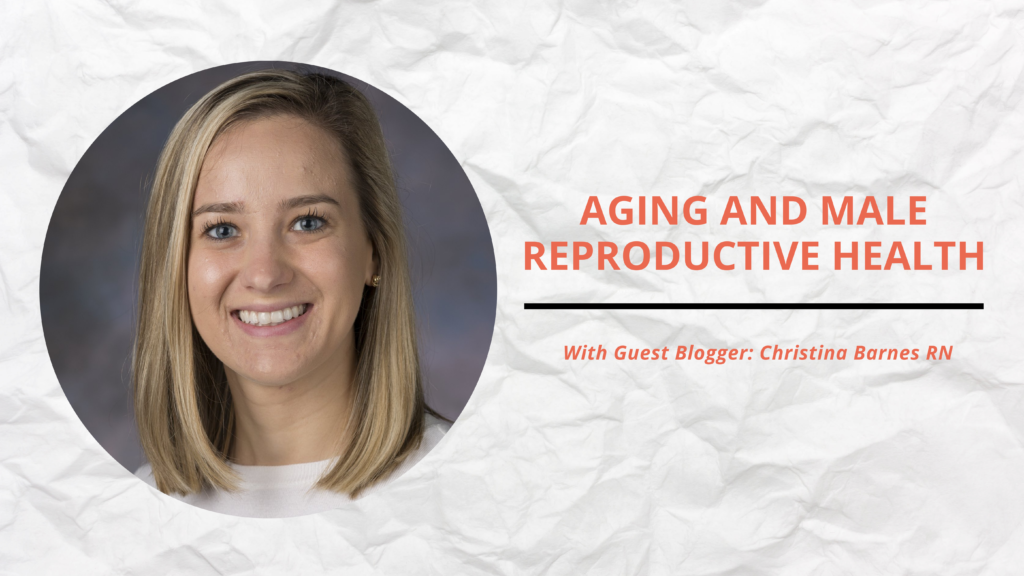Aging and Male Reproductive Health
Read on to learn more about how aging can affect male reproductive health

Do men have a “biological clock” when it comes to their ability to have children? This idea seems like an inevitable part of female fertility, but what about men? Does their fertility diminish over time? The answer to this question is yes, although men are still able to father children well into old age. There are documented cases of men in their 90s having children; the Guinness Book of World Records lists the oldest documented father at 92 years old! As remarkable as this is, advanced paternal age does come with some risks.

Male Fertility Timeline
As men age, their semen volume, sperm concentration, and total sperm count will generally decrease. The number of motile sperm (moving sperm) and progressively motile sperm (sperm moving in a straight line) will decrease. The number of sperm that are of normal shape and size will also decrease. In addition to these biological changes resulting from age, older men have simply had more time to be exposed to diseases, stress, and negative lifestyle choices like smoking.
There is no standard age for what is considered the starting point of advanced paternal age, but many providers consider this to be around ages 40-50 years old. Sperm banks, like Fairfax Cryobank, will not allow sperm samples from donors over 39 years of age.
Genetic Diseases
As men age, their sperm become more likely to contain random mutations in different genes. Why does this happen? “Think of this like a xerox effect,” says Suzanne Seitz, Genetic Counselor at Fairfax Cryobank. “The more times you copy the same thing, in this case, DNA, over and over, the more likely you are to get point mutations within the DNA.” It helps to understand that the creation of sperm involves copying DNA and replicating cells billions of times per month. As men age, this process becomes less efficient and more prone to errors.
These point mutations within the DNA can be randomly spread across the DNA, but they can also be associated with genes that cause disease. When a mutation alters a gene that can cause disease, this can cause genetic disease in the child. These diseases are autosomal dominant, as only one copy of the gene is needed to cause the disease. Genetic diseases seen as a result of this process include Apert, Waardenburg, Cruzon, Pfieffer, and Marfan syndromes.
Fortunately, the chances of a father over 40 years old causing these diseases is relatively low. About 0.3% to 0.5% of children whose fathers are over 40 years old have an autosomal dominant disease caused by a new genetic mutation.
Birth Defects
In a recent study, scientists examined the association between paternal age and birth defects. They reviewed 5.2 million infant reports from the 1999-2000 CDC birth and infant mortality database, comparing the rates of birth defects across all paternal ages. Using 25-29 year-old fathers as the baseline, they then calculated how much more or less likely fathers in other age groups are to have children with certain birth defects.
The overall rate of birth defects in the US during this time period was 1.5%. The comparison across age groups recognizes that birth defects occur in all groups, but the researchers wanted to know if birth defects are more common in some paternal age groups as compared to others. They found that advanced paternal age was related to a statistically significant increased risk of heart malformations, other cardiovascular or respiratory defects, tracheo-esophegeal fistula, musculoskeletal and/or skin abnormalities, Down’s syndrome, chromosomal anomalies, and overall birth defects. With Down’s syndrome, for instance, a father older than 50 years old is 1.39 times as likely to have a child with Down’s syndrome as compared with a father that is 25-29 years old. Comparing across the same age groups, a father over 50 is 1.16 times as likely to have a child with a heart malformation, 1.04 times as likely to have a child with musculoskeletal and/or skin abnormalities, and 1.44 times as likely to have a child with other chromosomal anomalies.
Neurological Issues
Scientists aren’t sure if advanced paternal age affects a child’s IQ; not enough research has been done in this area. The studies that have been done show no effect on child IQ or a slight negative effect, but there does not seem to be any obvious large cognitive deficit in otherwise healthy children.
Two conditions that have been linked to advanced paternal age, however, are schizophrenia and an autism spectrum disorder. The children of men over 45 years old are about 2 to 3 times more likely to have schizophrenia than children with fathers under 25 years old. Scientists believe the cause of schizophrenia in offspring of older men is due to mutations in the sperm that happen during sperm creation.
Advanced paternal age has not been proven to be the sole cause of autism, but there does seem to be an association between the two. A recent review looked at 27 studies on autism and the parent’s age and found that an increase of 10 years in a father’s age was associated with a 21% higher risk of autism. Similarly, an increase of 10 years in a mother’s age was associated with an 18% higher risk of autism. From the paternal standpoint, this increase in autism may be due to spontaneous or random mutations in the sperm, but the exact mechanism is unknown.
I am a man of advanced paternal age – now what?
Despite these risks, most healthcare providers are supportive of older men who want to have children. Most of the risks we discussed are relatively low, but it is important to speak with your healthcare provider to discuss your specific concerns. Many couples and individuals are choosing to have children later in life, and for a lot of men, this can be a realistic and healthy option.
Resources
Yang, Q., Wen, S. W., Leader, A., Chen, X. K., Lipson, J., & Walker, M. (2007). Paternal age and birth defects: how strong is the association? Human Reproduction, 22(3), 696-701
Wu, S., Wu, F., Ding, Y., Hou, J., Bi, J., & Zhang, Z. (2017). Advanced paternal age and autism risk in children: a systematic review and meta-analysis. Acta psychiatrica Scandinavica, (135)1, 29-41.
For more information on how Fairfax Cryobank supports families living with infertility visit our Couples Facing Infertility resource page.







